Sisters is a compass bearing
Last updated 6/1/2021 at Noon
Becca Rose is a traveler, poet, author, editor, student, and a 2011 graduate of Sisters High School. Her love for Sisters is deeply held. Within that appreciation, she also found a need for interrogation and understanding. Her evolving perspective came into focus after putting distance between her and Central Oregon. But whether she ventures north, south, east, or west, Sisters is a compass bearing with a strong pull on her heart.
Rose reflects on her childhood in Sisters through poetry and various literary genres. She often finds it hard to explain her hometown to people she meets.
“It’s a place where a quilt show, a rodeo, and a folk festival are very essential parts of your upbringing. For my friends and me, there’s still a very strong connection to the place we grew up. I know so many people who have moved back and are making their lives there,” said Rose from her home in San Diego. “If they can’t live in Sisters, at least they stay connected through events like the Folk Festival. I also have more close childhood friends than most people I meet.” Rose thought her experience was normal. After hearing other people’s stories, she realized having those close connections to her childhood home wasn’t typical.
Through writing and self-reflection, Rose is examining the full spectrum of small town life in Oregon.
“Growing up in Sisters there are entangled feelings of reverence for this community that held and continues to hold me, and also frustration for the narrowness of identity I was expected to embody,”
she said.
Rose felt like she was only allowed to show a curated version of her identity.
When she’s asked about growing up in Sisters and how it influenced her life, the answer is complicated.
“It took leaving Sisters and meeting people in college and traveling to see it clearly,” she said. “I’m still stripping off those expectations and ingrained ideas. It has to do with sexuality, race, and whiteness, with Christian norms, gender, and how I viewed myself and what was expected of me as a woman.”
After high school, Rose attended Western Washington University (WWU) in Bellingham. Feeling a bit lost in the size of the school’s undergraduate population, she enrolled in a small college within WWU called Fairhaven College. She designed her own major with a mix of creative writing, and women and gender studies.
Primarily responsible for financing her education, Rose thought most people were taking out loans and working part-time or full-time jobs like her. Then she began meeting students who had family who paid for everything.
“They didn’t have any loans and had money to live off of without having to work,” she said. “I had two to three jobs while I was going to school full-time. I covered school tuition between scholarships and loans. I worked hard in high school to get scholarships. I’ll carry the loans for a long time. I did have some help from my parents and I’m thankful for all the support they could give.”
Through Sisters GRO, Rose received a Kiwanis scholarship, a veteran’s appreciation scholarship, and the Steven Connolly Memorial Grant.
“That was so meaningful and special. I wrote an essay recalling a favorite memory about Steven. I also got a scholarship at my college based on my GPA,” said Rose.
During college, Rose worked in a spa, sold olive oil and vinegar, worked in an assisted-living facility for adults with disabilities, and worked in a restaurant.
“I often did back-to-back shifts,” she said. “I also worked to fund my travels, which I did almost entirely on my own. It was a privilege to have a U.S. passport and take time off from my studies.”
For Rose it’s been important not to follow traditional timelines for school.
“It took me seven years to get through undergraduate,” she said. “I took time off in-between my sophomore and junior year to travel alone in South and Central American for three months. Between my fourth and final year, I took a year to live in the Dominican Republic after receiving an Adventure Learning grant from Fairhaven College.”
After graduation, Rose traveled to South East Asia, New Zealand, Australia, and Western Europe. When she returned, she came back to Sisters and lived with her mom for a year and a half.
“It was a fantastic year being in Sisters and working in Bend at Spork,” she said. “I connected with so many other people who left and came back to Central Oregon. Then I moved to San Diego to start graduate school.”
Rose knows some of her experiences in Sisters are universal, especially in small towns.
“We were in a town where we knew everybody. There was more pressure to be perceived in accepted ways. The conservative side of Sisters was such a norm for me that it took leaving before I finally realized I had a lot to unlearn about the world and how people are supposed to behave. This is a time where we’re being asked to reckon with our whiteness in a public way. Growing up in Sisters didn’t prepare me for what that really meant. It was such a bubble. I thought my experience of the world as a white person was the norm. I think it needs to change starting young, in our schools and communities.”
Rose had a hard time during her high school years.
“Going through challenging times in any family is hard, but in a small town, it feels like everyone knows about it, too,” she said. “I think about how sad it was for my mom when she came out and I couldn’t accept it. That’s heartbreaking to me. Part of that is my own responsibility but it was also such a product of my surroundings, culture, and religion. Those are things I’ve had to shed about my upbringing and community.”
Rose is constantly amazed that even with the painful things she never stopped wanting to return to Sisters.
“That’s pretty incredible when you love a place so much that the ways it harmed you are not reasons to abandon it, but actually reasons to keep loving it and wanting it to change and become a place that can evolve in the ways it didn’t serve me,” she said. “I’m pushing back now for future generations. It’s a big part of my writing.”
Almost all of Rose’s writing relates to the landscape, physical place, and environment of Sisters. My reverence for the natural world and how the landscape affected me is a way to interrogate some of the things about growing up there that I want to challenge. When she was in the IEE high school class, Rose went on a backpacking trip on Middle Sister in a blizzard. The two other girls in her group got sick, leaving her as the only girl.
“I was so nervous about being able to keep up and self-conscious being in the woods with people I went to school with without wearing any makeup,” she said. “I was deeply self-conscious about my body and felt I didn’t meet the beauty standards of thinness.”
There was a moment, in an absolute whiteout, hiking to Hayden Glacier in full snow gear, when she couldn’t see anything. The only sound was the shuffling of people behind her.
“Looking down at my legs trudging in deepening snow, I was so grateful they were strong enough to hike up to a glacier in the middle of a blizzard. That was the first moment, I was able to think about my relationship with my body based on what it was able to do, its strength, how it could take me up a mountain rather than how it appeared and pleased other people. That was meaningful to me. My struggles with my body image would continue but it was a seed I could look back to and expand on later,” said Rose.
“I write about finding overlaps or layers. The things around me in the natural environment that point to or teach ways I can relate to my body. Maybe that primed me to realize many of the answers about why we’re expected to fit in so many boxes that actually just harm us. I found a way to escape those confines by looking at the landscape of my hometown.”
Rose is pursing her masters of fine art in writing. Her work has appeared in io Literary Journal, InkSpeak, and Tides Zine.
Kaleidoscoped is a new literary magazine formed by MFA students at UC San Diego with Rose as the founding editor: http://www.kaleidoscopedmag.com.

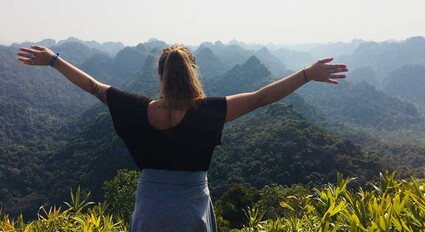
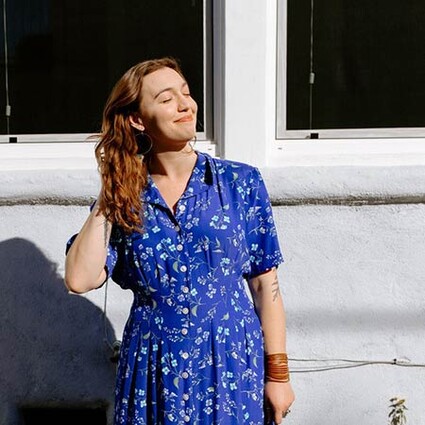
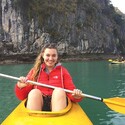
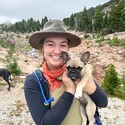
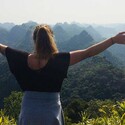
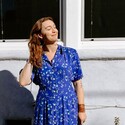















Reader Comments(0)